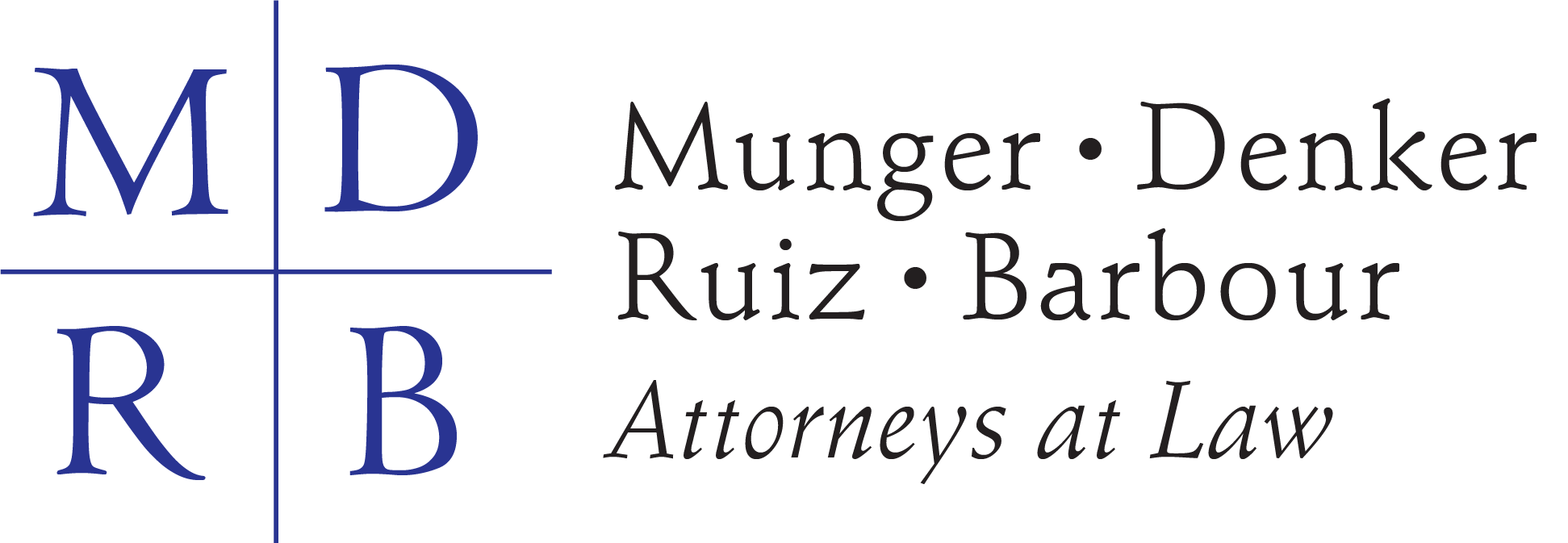
Another Victory for Munger • Denker • Ruiz • Barbour
Continuing the firm’s unequaled record of success in representing clients with complex legal needs, partners Andrew Barbour and John Anderson of Munger • Denker • Ruiz • Barbour recently emerged victorious in their latest jury trial. The outcome preserves their clients’ rights through a successful verdict on claims of breach of contract and breach of the implied covenant of good faith and fair dealing.
The Agreement at Issue in the Litigation
The firm’s clients (the plaintiffs) were a married couple, and the defendant was the clients’ adult daughter. While the daughter was attending college, the parents and the daughter entered into a contract whereby the parents agreed to pay the down payment on a house for the daughter to live in, and the daughter agreed to use rents collected from roommates to make payments on the mortgage. The parents owned a fifty-percent interest in the house, and the daughter owned the remaining fifty-percent interest. The parents and the daughter all were liable on the mortgage jointly. The agreement stated that if the daughter refinanced the mortgage into her own name upon graduation with a bachelor’s degree, the parents would sign over their interest in the property to the daughter. In short, the parents would gift the house to the daughter, so long as the daughter used her roommates’ rent to pay the mortgage until graduation, and then refinanced and removed the parents from the mortgage.
The Unmet Obligations
After the house was purchased, the daughter kept all of the roommate rents she received for herself, and did not apply them to the mortgage, leaving the parents with no choice but to make the mortgage payments themselves while the daughter was in college in order to prevent foreclosure. Then, when the daughter graduated from college with her bachelor’s degree, she did not refinance the mortgage. Instead, the daughter moved out of the house and hired a rental-management company to lease out the property. The daughter also stopped communicating with her parents altogether.
Years of Dispute and Legal Action
For almost seven years after the daughter graduated from college, she did use the tenant income to keep the mortgage current — but the amount of those rents was more than the cost of the mortgage payments, and the daughter kept the excess profits for herself without sharing them with the parents.
The parents reluctantly filed suit against their daughter for breach of contract, breach of the implied covenant of good faith and fair dealing, partition, and contribution. The parents sought to compel a sale of the property, to recover the daughter’s share of expenditures on the property, and to recover the parents’ share of the roommate and tenant rents that the daughter had kept for herself.
The daughter counter-sued for breach of contract and breach of the implied covenant of good faith and fair dealing, claiming that the daughter had fulfilled her obligations under the contract and that the parents were obligated to give daughter the house.
Trial and Verdict
A four-day jury trial was held on the breach-of-contract and good-faith claims. At the conclusion of the trial, Mr. Barbour and Mr. Anderson secured a jury verdict in favor of the parents and against the daughter on both the parents’ claims and the daughter’s counterclaims. The jury awarded the parents damages in the exact amount that the parents had been seeking.
The Postscript
Family disputes often lead to complex legal disputes. In this case, the parents and the daughter had been estranged for years before litigation began, but the parents still love their daughter very much. While many firms litigate through a scorched-earth campaign of personal attacks against the opposing party, neither the parents nor Munger • Denker • Ruiz • Barbour had any interest in causing the relationship to deteriorate further. Andrew Barbour and John Anderson litigated the case very effectively — and yet respectfully — in accordance with the firm’s guiding principle:
“Fearless advocates, but courteous foes”
For more information on how our attorneys can assist you with your legal needs please visit our page. To schedule a consultation with Munger • Denker • Ruiz • Barbour, please visit the link below.
Latest Posts
Quiet Title
Normally, it is simple to determine who is the lawful owner of real property: Whoever is listed on the last deed recorded with the county recorder’s...
Quiet Title
Safeguarding Your Interests in Arizona Probate Court
What Is Probate Court? A probate court is one that has authority or jurisdiction over all cases involving wills, trusts, estates, and...



